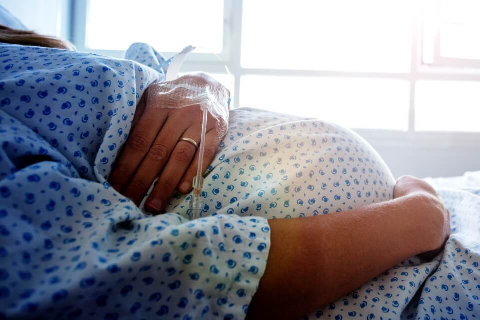- Home >
- Birth Injury Claims >
- Stillbirth Claims
There are no words that can properly console a parent after the loss of their baby. It is one of the most painful experiences imaginable – one made even harder to come to terms with when more could have been done to save your child.
If you have been affected by stillbirth, our compassionate solicitors can help you hold those responsible to account and give you the financial security you need to move on. With over 30 years of exclusive experience in clinical negligence and millions won in compensation, trust us to help you close this difficult chapter for you and your family.

Do you have a stillbirth claim?
Around 1 in 250 pregnancies each year sadly end in stillbirth. While this often cannot be prevented, sometimes negligent acts by a doctor or midwife – from failing to spot warning signs during pregnancy to mishandling the labour – can lead to completely avoidable deaths.
We know first-hand how traumatic it is to lose a child this way. If this has affected your family, we can guide you through every step of making a stillbirth claim. While no amount of compensation can bring your baby back, it can ensure you do not suffer financially as well as emotionally, and help prevent another family from facing the same heartache you have felt.

The specialist stillbirth claims solicitors for Essex & East Anglia
During this difficult time, it is vital to have a team by your side with the experience, empathy and expertise to help you get answers and hold those at fault accountable.
Since 1993, our stillbirth claims solicitors have fought to give heartbroken parents their right to justice. Through sensitive advice and a methodical approach to investigation, we strive to make your claim as stress-free as possible. We work on a ‘no win, no fee’ basis to remove any financial risk from your claim, and 96% of our cases are settled outside of court.
What does our stillbirth claims process look like?

A free initial consultation
Call us, request a callback or complete our online form and we’ll assess if you have a valid medical negligence claim.

Funding your claim
Discover the ways we can fund your claim without you paying a penny at any stage of the process.

Investigating evidence
We gather medical records, witness statements and more to learn what happened to you and prove your claim.

Instructing independent medical experts
We work with impartial, experienced medical experts to establish whether your injuries were due to substandard medical care.

Valuing your claim
We assess your health and financial losses to accurately estimate how much compensation your claim is worth.

Presenting your case
We contact the Defendants and the Courts on your behalf to set out your allegations and receive a response.

Negotiating a settlement
We work to achieve a fair settlement for you outside the courtroom – this is how 96% of our cases end.

Preparing for Trial
If we must proceed to Trial, we fully prepare you for what to expect so you receive the right result in court.
FAQs about stillbirth claims
How can stillbirths happen?
While pregnancy complications are far less frequent thanks to medical advances, it is impossible to guarantee a successful outcome. In England, approximately 1 in 250 births is stillbirth, and it accounts for over half of the deaths of children under the age of 1 in the UK.
There are numerous ways a stillbirth can be caused:
Placental abruption
Around half of all stillbirths are linked to complications with the placenta, which supplies the baby with oxygen and nutrition. Placental abruption is when the placenta separates from the uterus before the baby is born. This may be caused by a blow to the stomach, or be linked to conditions like preeclampsia or fetal growth restriction, but sometimes there is no clear cause.
Infection
1 in 10 stillbirths are caused by the mother contracting an infection such as rubella (German measles), flu, Lyme disease, malaria or chlamydia.
Preeclampsia
Preeclampsia is a condition that typically occurs after 20 weeks of pregnancy, causing the mother to experience high blood pressure. Ultimately, it can lead to eclampsia which can be life-threatening for mother and baby. While this can be managed temporarily, the only cure is to deliver the baby.
Gestational diabetes
Around 18% of pregnant women develop gestational diabetes. If not diagnosed by a healthcare professional, the risk of fetal death is over 4 times higher.
Birth defects
A genetic defect in the baby is the reason for approximately 10% of stillbirths.
Haemorrhage
Excessive blood loss experienced before or during labour can cause a stillbirth.
Although these conditions can occur in any pregnancy, there are several risk factors for stillbirths that increase the possibility of this occurring:
- Having a multiple pregnancy
- The mother is over the age of 35
- Smoking, drinking alcohol or misusing drugs while pregnant
- The mother’s Body Mass Index (BMI) is above 30
- The mother has a pre-existing physical health condition, such as epilepsy
When is medical negligence to blame for a stillbirth?
There is very little a healthcare professional can do to cause a stillbirth. Instead, when we refer to medical negligence concerning stillbirths, it is often due to a failure to monitor the baby’s progress, or a failure to act on warning signs that indicate a higher risk of stillbirth.
For example, reduced fetal movement may indicate a baby is not receiving enough oxygen or nutrients. If a mother tells their doctor or midwife that their baby’s movement has changed, but they fail to check or their monitoring is substandard, this can have devastating consequences.
Failing to spot warning signs based on the baby’s CTG (cardiotocography) monitoring, or not reacting to changes in the baby’s growth trajectory, can also prevent the mother or baby from receiving a treatment that may save the baby’s life, or delaying one until it is too late.
Furthermore, if an obstetric emergency during labour, such as shoulder dystocia or a breech delivery, is mishandled, this can deprive the baby of oxygen. In the most tragic circumstances, this can cause the baby to be stillborn, even if it was healthy before labour.
View our National and Essex Medical Negligence Statistics post for more industry insight.

How do I make a stillbirth compensation claim and what should I expect?
Do you believe your baby's death could have been due to the actions or inactions of a healthcare professional? Our stillbirth claims solicitors are here to help investigate your claim, guide you through the process, and ensure you receive the ruling you deserve.
At Gadsby Wicks, we know that a stillbirth claim is about more than financial compensation – it is about getting answers. When you work with our solicitors, we investigate medical records, witness statements and all other evidence to determine what happened, and speak with impartial medical experts to establish if you and your baby’s treatment was negligent.
If we believe that a healthcare professional breached their duty of care towards you and your baby, and this directly led to the stillbirth, we will pursue a settlement with the Defendants, and help present your case should it proceed to court.
We will be with you every step of the way, ensuring you achieve the closure, compensation and justice you are entitled to.
How long do stillbirth negligence claims take to settle?
In most circumstances, we anticipate a stillbirth claim to take between two and five years to reach a final settlement.
During this time our expert medical negligence solicitors will work with the claimant to establish what happened, determine if negligent care was a direct cause of stillbirth, and quantify the value of their claim based on the physical, psychological and financial damages the claimant sustained.
Many claimants for stillbirth also use this time to engage with untoward incident reports and file letters of complaint with those responsible for their baby’s death. This can help to encourage the defendants to introduce measures that prevent what happened to the claimant from happening to other parents in future, and that their baby’s death results in positive change.
How long do you have to make a stillbirth claim?
A stillbirth claim, like other types of birth injury claims, must be made within three years of the baby’s death. There is no time limit for anyone who is mentally incapacitated.
In some circumstances, the courts will allow claims outside this time. We can advise you on whether your claim is likely to be considered.
What is the average settlement amount for stillbirth negligence claims?
No amount of money can compensate for the loss of a baby. However, it can cover the costs for any psychological treatments and therapies to help a mother move on from this devastating event, and move on with their life as comfortably as possible.
Compensation can also pay for any items purchased in anticipation of the baby, such as clothing, cots and toys, if you intend on never using them in the future. In many circumstances, stillbirth claims will settle for between £30,000 and £50,000.
It is important to note that in a stillbirth claim, the mother is the claimant. It is very difficult for the father to bring a claim for psychological injury unless they have suffered from shock – for example, if the baby was born dead and neither parent had any prior knowledge of this.
Moreover, parents cannot receive the statutory bereavement award of £15,120 in cases of stillbirth. Unfortunately, this award is only available if the child is born alive and passes away under 18.
Contact our expert stillbirth claims solicitors
If you or a loved one have suffered a stillbirth due to negligence and would like to discuss your options, our team is here to listen and advise you on your next steps.

Lexcel accredited medical negligence claims solicitors
We are proud to be a Lexcel-accredited practice. The accreditation is a mark of quality and comes directly from the Law Society.
A recent assessment described us as a “Centre of Excellence” and we continue to operate to the highest standards across all main areas of our field. These include client care, case management, financial management, structure and strategy, people management, risk management, information management and file management.








